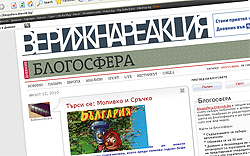
Bulgarians use the internet daily

Compared to developed European countries – in which 48 percent of population uses the internet every day, 60 percent does it at least once a week, while 30 percent has never used the web – 31 percent of Bulgarians use the internet every day, 40 percent at least once a week, while 53 percent have never used it, said Zinaida Zlateva, the head of the Representative Office of the European Commission in Bulgaria, while presenting the results of latest research.
These percentages were probably on the mind of the mayor of the Bulgarian city of Kardzali, near the Bulgarian-Turkish border, who has recently organized the first on-line wedding in Bulgaria. Journalists were able to watch the ceremony on the web, but in the near future everyone will be allowed to use the service at a nominal fee of 15 euro. The mayor believes that there are many Bulgarian expatriates around the world who would be interested in such exhibitionism and that an investment of 1.500 euro (the price of two cameras) could allow him to earn 30.000 euro a year.
I chose this example because one of the most influential media experts and the president of the Council on Electronic Media in the Bulgarian Broadcasting Agency, Georgi Lozanov, is of the opinion that the internet as a whole could be called a new media.
Blogs, which are a part of the global network, represent a new kind of journalism. A new formula is present which changes the entire concept of journalism due to the contact between journalists and readers. It should be noted that two years ago professor Lozanov prophesied that the previous Bulgarian government would be removed from power not by traditional media – as usually happens near the end of mandate – but by the internet, which is a home to main critical voices and energy of the resistance.
In Bulgaria, a discussion is ongoing about whether blogs are a media or not. Some believe that blogs fill a gap and allow free expression that is impossible to realize in the traditional media. Others believe that blogs are not a media because they offer information that is completely distorted from the point of the author. According to Bulgarian opinions, blogs are attractive, but those who seek unbiased information should search multiple sources, among them the media, which consider the truth to be their obligation and a mark of high professionalism.
Media companies in Bulgaria and their PR agencies systematically research whether the new media can defeat the daily and weekly press, since in the last few years a significant drop in circulation has been evident, many newspapers have been closed overnight and replaced by web journalism. Still, Bulgarian journalists and media experts optimistically prognosticate that print media will not die out quickly, because today's readers like to read opinions, analyses and information in their original form on paper. There will always be at least one high-quality print media, perhaps only thanks to businessman's or common Bulgarian's habit to start a new day with a coffee and a newspaper in their hand.
On the other side, the new media, however marginal at the moment, steadily increase their influence in Bulgaria together with emergence of new generations. Free journalism increasingly often moves to the internet, while the audience has begun writing on their own, without external boundaries to its freedom that exist in the traditional media. Their commercialization has resulted in a creation of a virtual civil society with its own influence and its own place that is now more important than earlier.
My own experience tells me that if an information or a report from Serbia is not posted on the web site of the DARIK Radio – which is often called a Bulgarian B92 – then all my efforts were in vain. This is why all major TV and radio stations and print media outlets strive to create competitive news web sites within the Bulgarian media scene. This is a clear indication that the new media will eventually win the battle, if not today, then tomorrow.
People used to say that if it was not on TV, it didn't happen, said a Bulgarian journalist. The situation is different today – imagine not being able to find an information on the internet... That would mean that something is not what is seems to be...
Eli Stojneva Jurukova
MC Newsletter, August 13, 2010
View all comments (0) Leave a comment
Published comments contain opinions that are not the opinions of Media Center. Responsibility for the content of messages and their accuracy lies on the website users who posted them.




